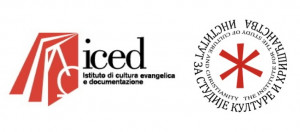Istituto di Cultura Evangelica e Documentazione and The Institute for the Study of Culture and Christianity are pleased to announce a
CALL FOR PAPERS
for an International Colloquium on
RE:FORMATIONS ↔ MODERNITIES ↔ ORTHODOXIES
Date of the colloquium: November 24, 2017
Deadline for paper proposals: September 20, 2017
Location: ICED, Rome, Italy
The points of departure of this colloquium are two jubilees commemorated in 2017: the 500th anniversary of the beginning of the Protestant Reformation (1517) and the 100th anniversary of the Russian Revolution (1917). These two events can be interpreted as critical in the history of modernity and for the way in which the whole modernity project has been understood and interpreted.
The Protestant Reformation was not only a major event in the religious history of Europe, but also a process that made a decisive impact on the development of modern western society and culture. Two important aspects of the Christian tradition were highlighted in the Reformation and its aftermath—the paradoxical mixture of both “reform” and “orthodoxy” as two constitutive aspects of Christian history, but also as two principles that would become central to the whole modernity project. The “reform/innovation” principle can, for instance, appear in the form of “progressivism” as a typically modernist paradigm, which becomes in itself a form of legitimization of various social and cultural processes. On the other hand, during the period of modernity, the world also experienced various modern “orthodoxies,” that did not tolerate other approaches or any “reforms.”
These modern(ist) “orthodoxies” ranged from the “right ways” of modern totalitarianism, to the paradigms of “scientism” and “free market” ideology.
The Russian Revolution also occupies a strange and even paradoxical place in the history of modernity. On the one hand, it brought with it an outburst of creativity in many spheres of society and culture. It gave a promise of a new world, which would be open to all and based on the most progressive ideas of the modern period. However, in its aftermath the other face of modernity was manifested, one of terror, oppression, and enslavement.
The 500th anniversary of the Protestant Reformation and the 100th anniversary of the Russian Revolution offer an opportunity to reflect upon modernity, its reformations and reforms (but also its “Orthodoxies”), and the hidden or obscured aspects that modernity (through both of these events) advanced. The main goal of this colloquium is to illuminate those aspects of modernity and modernization that have been marginalized, obscured, suppressed, forgotten, erased, mistaken, or falsified.
Keynote paper by
Hans Küng
Coordinators:
Prof. Leonardo De Chirico, Ph.D. Prof. Davor Džalto, Ph.D.
Paper proposals (abstracts) should contain between 250 and 400 words.
An abstract and a short CV (not to exceed 1800 characters) should be sent no later than September 20, 2017 to: reformationmodernityorthodoxy@gmail.com
There will be no conference fee for speakers. Selected papers will be published.



